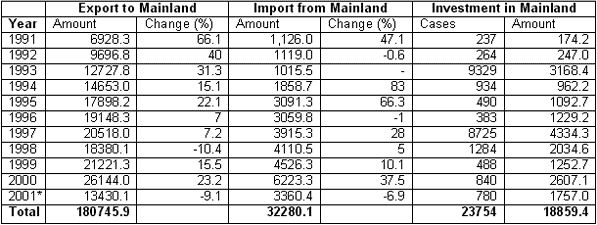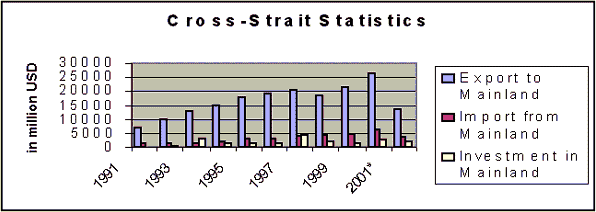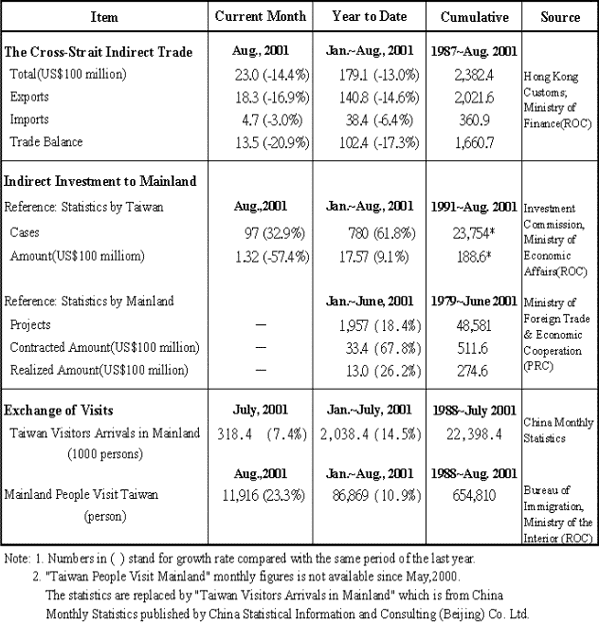|
Economic Exchanges Across the Taiwan Straits
1. Situations of the Cross-Straits Exchange
Economic exchanges across the Strait have developed rapidly despite political tensions.
Being interested in capital and technology and trying to link Taiwan closer to the mainland, China encouraged more intensive economic exchanges.
Taiwan's attitude, on the other hand, is quite ambivalent: while political leaders worry about their geostrategic security, business persons hurry to the mainland to seek their opportunities. Being an export-oriented economy and depending heavily on the world market, Taiwan can not neglect the huge market of mainland China. Economic activities across the Taiwan Straits were thus made through third parties (in most cases via Hong Kong).
1.1. Trade Relations
According to the official statistics of Taiwan, the total trade volume has grown about 21 times from 1987 to 2000. With exports of USD 26.14 billion and imports of USD 6.22 billion, Taiwan's total trade volume with China reached USD 32.97 billion in 2000. Mainland China has therefore become the third biggest export destination of Taiwan. Taiwan had a trade surplus of USD 20.5 billion last year.
Affected by the global economic slump, bilateral trade has declined this year. Taiwan's exports to the mainland (USD 17.36 billion) and imports from the mainland (USD 4.26 billion) for the first nine months of this year declined by 10.7 percent and 7.8 percent respectively compared to the same period last year. Since the second quarter of this year, Taiwan's exports to the mainland have continuously declined each month, but the rate of decline has been lower than the decline in Taiwan's total exports to her ten largest export markets in the same period.
1.2. Taiwanese Investment in the Mainland
Since authorities in Taipei first allowed private exchanges between the two sides in 1987, Taiwanese total investment amounted to USD 46.5 billion by the end of 2000 in terms of contracted value, of which USD 25.29 billion was actually utilized, all according to mainland Chinese statistics. Taiwanese companies have, however, invested about USD 70 billion in mainland China, often using foreign offshore banking facilities (Virgin Islands e.g.) for investments on the mainland. The reason is very clearly the different legal protection of this investment under international private law. Mainland statistics do not regard these investments as Taiwanese. According to the Investment Commission in Taiwan, approved foreign investment during the first ten months of 2001 accrued to USD 5.98 billion, in which USD 2.33 billion was approved for investment to mainland China, an increase of 15.6% against the same period of last year. Mainland China has attracted 39% of Taiwan's total foreign investment, thus becoming the most important destination.
Geographically, Taiwanese investment is centered in Jiangsu and Shanghai area (52.6%), Guangdong (31.3%), Fujian (4.5%), Hebei (3.6%) and Zhejiang (2.6%). The investment covered the whole range of industrial products, from electronics and electric appliances to machinery, basic metals and metal products, precision instruments and transportation equipment.
1.3. Exchange of Persons
Migration across the Straits increased rapidly, but remains a one-way affair: much more Taiwanese entered the mainland, and very few people from the mainland visited Taiwan. Taiwan has long feared that Chinese spies or saboteurs might come to the island posing as tourists. Officials also worry that Chinese tourists might overstay their visa and work illegally.
However, Taiwan will partially ease curbs on Chinese visits as a goodwill gesture toward her political rival in Beijing. The Executive Yuan decided to allow mainland Chinese living or studying overseas to visit Taiwan, but keeping a daily quota of 1,000 visitors.
2. Taiwan's Presence in the Yangtse Delta Region
2.1. "Shanghai Fever" in Taiwan
A "Shanghai fever" has spread in Taiwan. By the end of October 2001, Taiwanese investment in Shanghai counted 4027 projects with a capital of USD 6.58 billion in terms of contract value, accounting for about 15% of total foreign investments in the city. During the first seven months of this year, 234 Taiwanese firms were set up, bringing a capital of USD 535 million into the city, up nearly fivefold from the same period last year. Electronics and IT industries are the most important areas for Taiwanese investors. With the coming of Tech-Front (Shanghai) Computer Corp., all five leading notebook PC makers from Taiwan have built production bases on the mainland.
The personnel flow from Taiwan to Shanghai grew, even though working conditions show an unfavourable tendency for many Taiwanese. In the late eighties, a Taiwanese sent to work on the mainland could earn a salary which was 80% higher than in Taiwan. Later, the figure went down to 50%, then 30%, and today the difference is even smaller. Still, there are many persons willing to work on the mainland.
More and more Taiwanese have settled down in Shanghai. Many of them integrated into Shanghai society and call themselves "Shang-Tai-nese" (in Chinese "Shang Tai Ren", an expression with a double meaning: the one is "Taiwanese in Shanghai", the other, a "man in power"). According to "Xinmin Weekly" (09-15.07.2001), there are about 300,000 Taiwanese working and living permanently in Shanghai and the surrounding area. The figure does not include business persons moving between Taiwan and Shanghai, estimated at about 10,000 persons per month.
2.2. The Taiwanese Community in Jiangsu
Taiwanese investment in Jiangsu Province is even stronger than the investment in Shanghai. By the end of June 2001, Taiwanese investors have invested a capital of USD 20.2 billion in terms of contract value in Jiangsu Province, of which, more than USD 10 billion was in Suzhou and USD 5.3 billion was in Kunshan. Workers in Taiwanese enterprises in Suzhou total about 200,000 persons.
In addition to electronics, IT and heavy industry, Taiwanese investment covers industries like bicycle production (GIANT BICYCLES with a total investment of 50 million USD and a
production of 1.7 million bicycles in 1999) and food processing (UNI-PRESIDENT ENTERPRISES CORP with a total investment of USD 90 million and an employment of 2500 workers). Today, many Taiwanese brands made in China have become famous brands in the mainland market, too.
In fact, "Taiwan Communities" in Suzhou and in Shanghai are joined together. So that their own school was set up this year in Kunshan after the first "Taiwan School" in Dongguan, Guangdong Province (in September 2000).
2.3. In Zhejiang Province
Taiwanese investment in Zhejiang is not as intensive as in Shanghai and in Jiangsu. Its momentum, however, is quite strong. By the end of June 2001, Taiwan's investment in Zhejiang numbered 3359 projects with a capital of USD 5.55 billion in terms of contract value.
3. Taiwan's Cross-Straits Economic Policy
In November this year, a new policy towards the mainland was adopted by the Taiwanese authorities. Instead of "no haste, be patient", the new policy was called "active opening, effective management". The policy shift involved a list of suggestions made last summer by an elite group of economic advisers to President Chen Shui-bian.
Under the new policy, Taiwan is now pursuing a proactive policy to make use of the market and resources in China. One of the most significant changes is the abandonment of the USD 50 million ceiling on single investments in China. Such deals will now be considered on a case-by-case basis. The authorities have developed a new investment review system that suits the needs of businesses and emphasizing macro rather than micro aspects of the investment flows. The new policy stresses partnership between the government and businesses in managing risks associated with investments in China.
4. Conclusive Remarks
The economic and political ties across the Straits will be further intensified. The healthy development of bilateral relations is of significant importance, not only for both sides on the Taiwan Straits but also for the rest of the world. The Swiss economy should and can profit from it. A closer contact, more experience exchanges and business co-operation between Swiss and Taiwanese companies on the mainland China will surely benefit both sides. The Consulate General will continue to follow new developments with great interest.
| December 14th, 2001, Shanghai
|
Li Rongzhang |
* * *
Table 1. Cross-Strait Economic Statistics
Units: million USD


Sources: Board of Foreign Trade; Investment Commission; Dept. of Economic Affairs, Taiwan.
*The figures of 2001 refer to the first seven months for export and import, and the first eight months for investment.
Table 2. PRELIMINARY STATISTICS OF CROSS-STRAIT ECONOMIC
RELATIONS
August 2001
Mainland Council
Affairs, Executive Yuan
October 31, 2001

14.12.2001
Consulate General of Switzerland
for business related matters, please reply: sha.vertretung@eda.admin.ch
|

![]()


